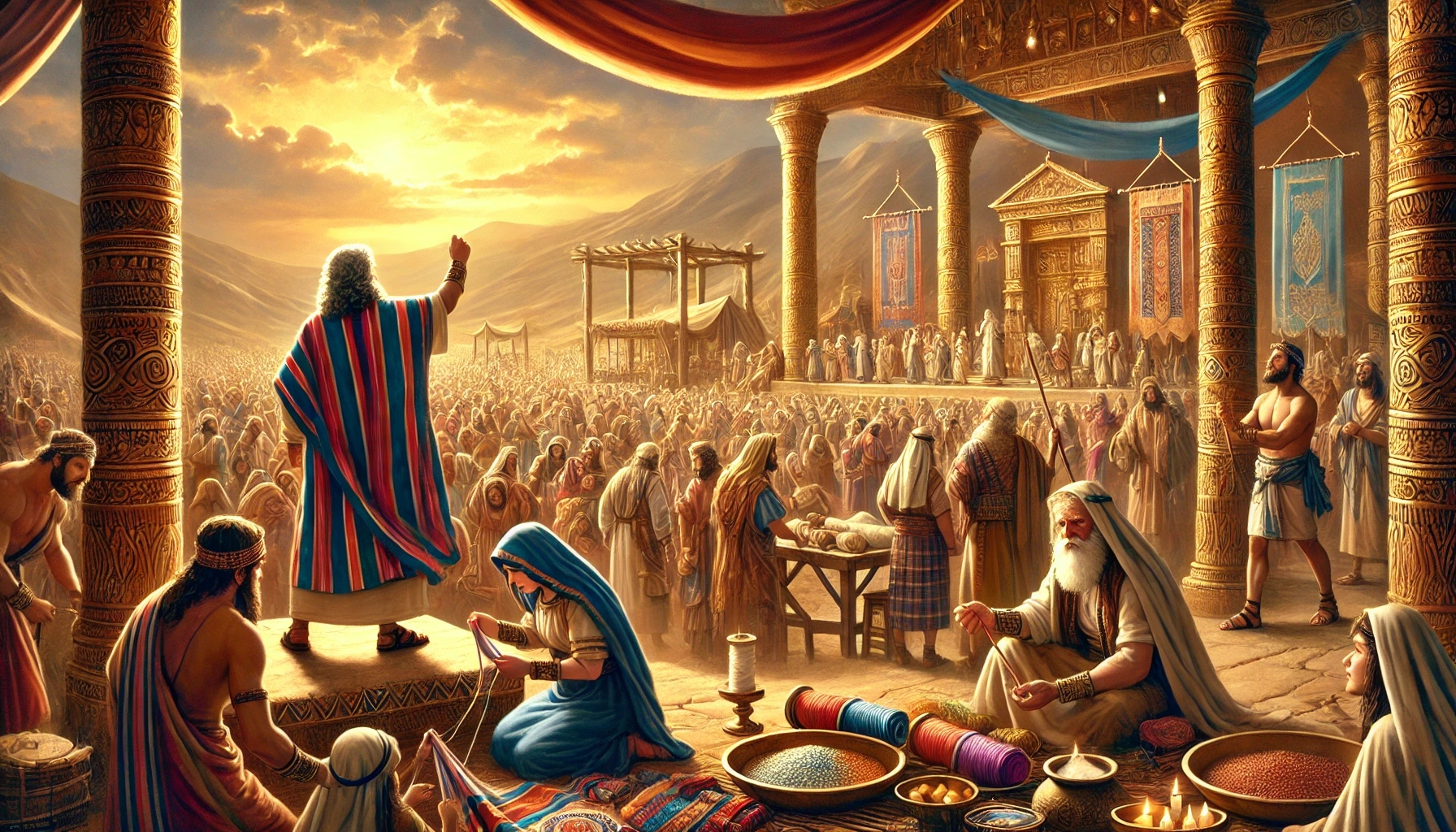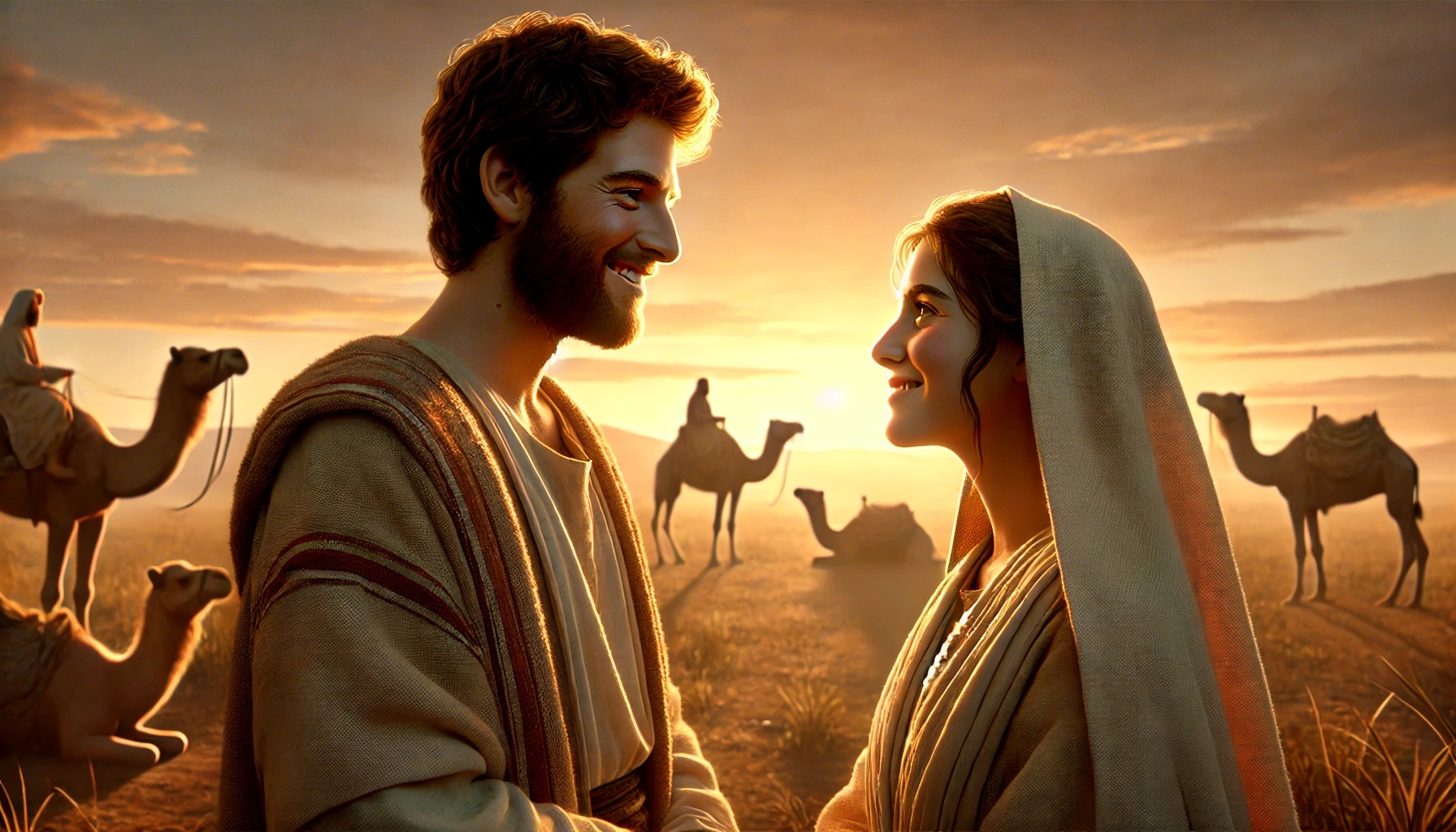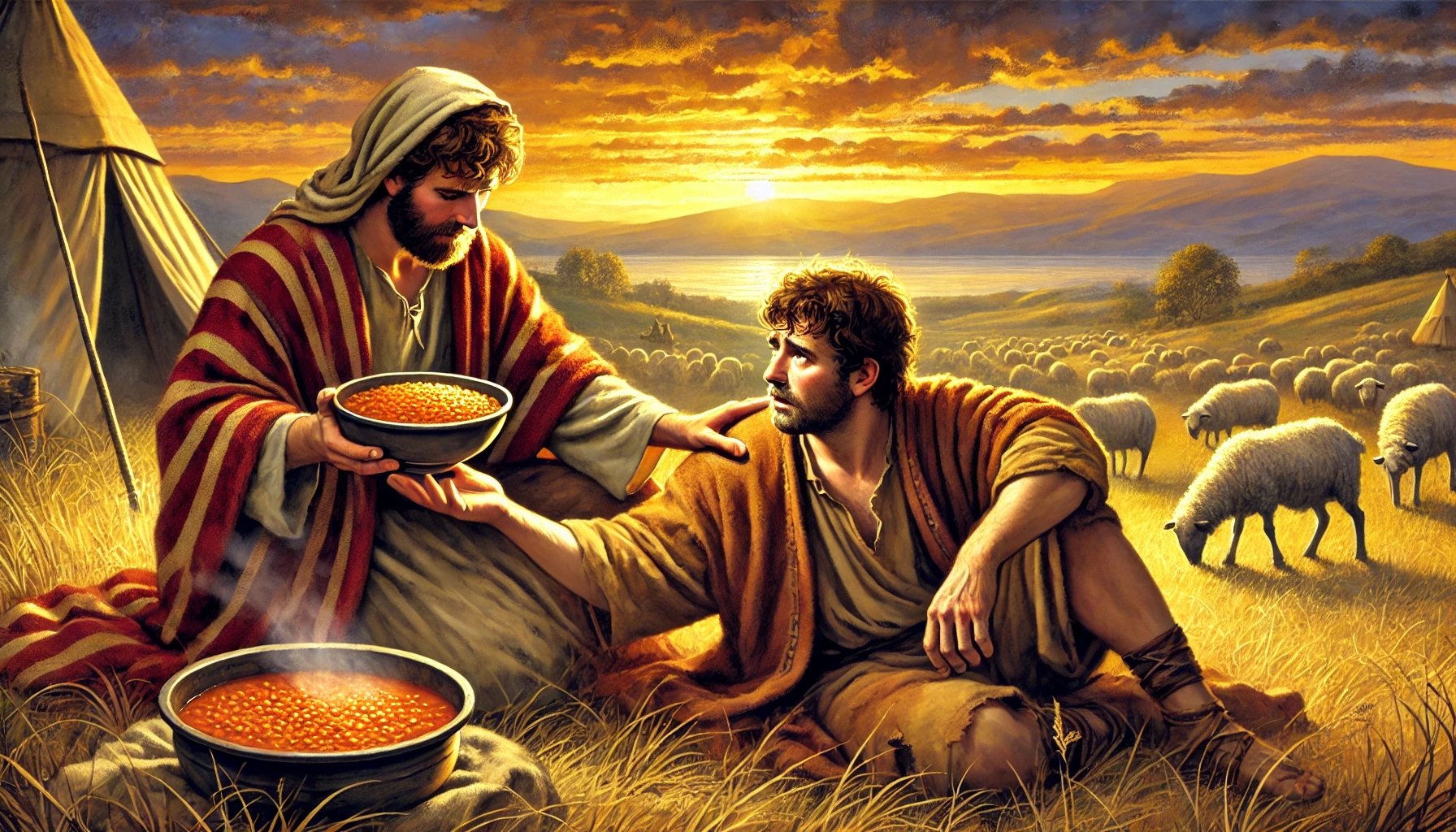1 And Moses gathered all the congregation of the children of Israel together, and said unto them, These are the words which the Lord hath commanded, that ye should do them.
2 Six days shall work be done, but on the seventh day there shall be to you an holy day, a sabbath of rest to the Lord: whosoever doeth work therein shall be put to death.
3 Ye shall kindle no fire throughout your habitations upon the sabbath day.
4 And Moses spake unto all the congregation of the children of Israel, saying, This is the thing which the Lord commanded, saying,
5 Take ye from among you an offering unto the Lord: whosoever is of a willing heart, let him bring it, an offering of the Lord; gold, and silver, and brass,
6 And blue, and purple, and scarlet, and fine linen, and goats’ hair,
7 And rams’ skins dyed red, and badgers’ skins, and shittim wood,
8 And oil for the light, and spices for anointing oil, and for the sweet incense,
9 And onyx stones, and stones to be set for the ephod, and for the breastplate.
10 And every wise hearted among you shall come, and make all that the Lord hath commanded;
11 The tabernacle, his tent, and his covering, his taches, and his boards, his bars, his pillars, and his sockets,
12 The ark, and the staves thereof, with the mercy seat, and the vail of the covering,
13 The table, and his staves, and all his vessels, and the shewbread,
14 The candlestick also for the light, and his furniture, and his lamps, with the oil for the light,
15 And the incense altar, and his staves, and the anointing oil, and the sweet incense, and the hanging for the door at the entering in of the tabernacle,
16 The altar of burnt offering, with his brasen grate, his staves, and all his vessels, the laver and his foot,
17 The hangings of the court, his pillars, and their sockets, and the hanging for the door of the court,
18 The pins of the tabernacle, and the pins of the court, and their cords,
19 The cloths of service, to do service in the holy place, the holy garments for Aaron the priest, and the garments of his sons, to minister in the priest’s office.
20 And all the congregation of the children of Israel departed from the presence of Moses.
21 And they came, every one whose heart stirred him up, and every one whom his spirit made willing, and they brought the Lord’s offering to the work of the tabernacle of the congregation, and for all his service, and for the holy garments.
22 And they came, both men and women, as many as were willing hearted, and brought bracelets, and earrings, and rings, and tablets, all jewels of gold: and every man that offered offered an offering of gold unto the Lord.
23 And every man, with whom was found blue, and purple, and scarlet, and fine linen, and goats’ hair, and red skins of rams, and badgers’ skins, brought them.
24 Every one that did offer an offering of silver and brass brought the Lord’s offering: and every man, with whom was found shittim wood for any work of the service, brought it.
25 And all the women that were wise hearted did spin with their hands, and brought that which they had spun, both of blue, and of purple, and of scarlet, and of fine linen.
26 And all the women whose heart stirred them up in wisdom spun goats’ hair.
27 And the rulers brought onyx stones, and stones to be set, for the ephod, and for the breastplate;
28 And spice, and oil for the light, and for the anointing oil, and for the sweet incense.
29 The children of Israel brought a willing offering unto the Lord, every man and woman, whose heart made them willing to bring for all manner of work, which the Lord had commanded to be made by the hand of Moses.
30 And Moses said unto the children of Israel, See, the Lord hath called by name Bezaleel the son of Uri, the son of Hur, of the tribe of Judah;
31 And he hath filled him with the spirit of God, in wisdom, in understanding, and in knowledge, and in all manner of workmanship;
32 And to devise curious works, to work in gold, and in silver, and in brass,
33 And in the cutting of stones, to set them, and in carving of wood, to make any manner of cunning work.
34 And he hath put in his heart that he may teach, both he, and Aholiab, the son of Ahisamach, of the tribe of Dan.
35 Them hath he filled with wisdom of heart, to work all manner of work, of the engraver, and of the cunning workman, and of the embroiderer, in blue, and in purple, in scarlet, and in fine linen, and of the weaver, even of them that do any work, and of those that devise cunning work.
10.07.2025 – Exodus Chapter 35 | BELIEVE HIS PROPHETS

📅 July 10, 2025
📖 DAILY BIBLE READING
✨ Exodus 35 – With a Willing Heart for God’s Work
⛺ God’s Commission – Our Contribution: Sabbath Rest, Voluntary Offering, and the Call to Participate in God’s Holy Work
══════════════════════════════════════════════
📜 Bible Text – Exodus 35 (KJV)
══════════════════════════════════════════════
🔵 Introduction
In Exodus 35 we find ourselves at a decisive stage of the wilderness journey. After the sin of the golden calf, God again calls His people to order, to worship, and to collaboration. Moses gives instructions for how the Tabernacle—the Tent of Meeting—must be constructed. It is striking how much emphasis is placed on the heart of the people here: “whoever is willing,” “whoever has a willing mind,” may build, carry, and serve.
This passage reveals a beautiful connection between rest (Sabbath), obedience, creative gifting, and shared responsibility. It’s about more than craftsmanship—it’s about heartfelt devotion.
══════════════════════════════════════════════
🟡 Commentary
🔷 1. Sanctifying the Sabbath (vv. 1–3)
Right at the outset, the Sabbath command is reiterated. The Sabbath is a sign of our relationship with God. Anyone who desecrates it stands against the Creator. No fire, no work—it’s a day of rest. Before any work can begin, there must be obedience and worship.
✦ Spiritual insight: True participation begins with alignment—not busyness, but listening to God.
🔷 2. Voluntary Gifts for the Sanctuary (vv. 4–29)
Moses calls the entire community to bring freewill offerings for constructing the Tabernacle—gifts given from the heart, not from obligation. Gold, silver, gemstones, fabrics, wood, oil—all are needed. It’s remarkable how varied the contributions are: the wealthy give precious metals; women spin yarn; the leaders bring in stones. Everyone gives according to their ability.
✦ Core message: God desires a willing heart, not a coerced gift (cf. 2 Corinthians 9:7).
✦ Unity in diversity: men, women, rich, poor—all contribute in their own way.
✦ Honoring craftsmanship: even the work of the women—spinning and weaving—is explicitly commended.
🔷 3. Appointing the Master Artisans (vv. 30–35)
God names Bezaleel and Oholiab, fills them with the Spirit, wisdom, and skill so they can oversee the work and teach others.
✦ God’s Spirit works not only in prayer but also in craftsmanship.
✦ Spiritual calling shows itself in everyday tasks. It’s not only about preaching but about devoted, excellent work.
══════════════════════════════════════════════
🟢 Summary
-
Sabbath: God’s rest is sacred and takes precedence over all activity.
-
Voluntary Gifts: The Tabernacle’s construction is sustained by willing hearts.
-
Gifts and Calling: God equips people with specific abilities for His service.
══════════════════════════════════════════════
📢 A Message for Us Today
God’s work doesn’t need coerced helpers but willing hearts.
Every person—whether creative, practical, wealthy, or spiritual—has a role in God’s kingdom.
In an age when many withdraw, God challenges us: What do you have in your hands?
Not everyone is a Bezaleel, but everyone can contribute—be it a talent, a prayer, or a helping hand.
══════════════════════════════════════════════
💡 Reflection Prompt
“Willingness is the language of faith.”
What if today you asked with an open heart,
“Lord, what can I freely give You today—not out of duty, but out of love?”
Perhaps it’s time. Perhaps it’s talents. Perhaps it’s simply trust.
~~~~~⛺~~~~~
📆 July 06 – 12, 2025
📆 WEEKLY SPIRIT OF PROPHECY READING
📖 Ellen G. White │ Patriarchs and Prophets – Chapter 15
✨ The Marriage of Isaac
📖 Read online here
══════════════════════════════════════════════
🔵 Introduction
In a world where personal freedom is often placed above wisdom and obedience, the story of Isaac’s marriage stands out as a radiant counterexample. It shows how God Himself takes the lead in one of life’s most important decisions: the choice of a spouse. Abraham, the father of faith, does not leave this matter to chance or mere emotion but trusts in divine guidance — and Isaac trusts him.
This event is not just a family story, but a powerful lesson about obedience, character formation, true love, and God’s blessing.
══════════════════════════════════════════════
🟡 Commentary
📌 1. The Spiritual Significance of Marriage
Isaac’s marriage was not just a personal matter — it had implications for God’s plan for humanity. Isaac was the bearer of the promise; from his line would come the chosen people and, ultimately, the Messiah. A marriage with a Canaanite woman would have endangered that spiritual mission, as these peoples were deeply immersed in idolatry.
➡️ Key thought: Marriage is a spiritual covenant — it shapes generations.
📌 2. Abraham’s Responsibility as a Father
Although old, Abraham takes full responsibility for Isaac’s marriage with great foresight. He sends Eliezer, his faithful servant, with a clear mission: the wife must come from their believing relatives — and Isaac must not travel to Mesopotamia.
Abraham’s trust in God’s guidance runs deep. He says with conviction:
“The Lord will send His angel before you.” (Genesis 24:7)
➡️ Key thought: Parental care and spiritual guidance are irreplaceable — especially in matters of the heart.
📌 3. Eliezer’s Spiritual Attitude
Eliezer does more than just set out — he prays. At the well, he asks God for a sign of kindness and helpfulness — traits fitting for a God-fearing life. Rebekah’s response to his simple request becomes the answer to his prayer.
➡️ Key thought: Those who pray sincerely can recognize God’s guidance — even in everyday encounters.
📌 4. Rebekah’s Decision – Free and Faithful Consent
Despite all the preparation, Rebekah’s own will is respected. When asked if she is willing to leave her homeland, she responds freely and confidently:
“Yes, I will go.” (Genesis 24:58)
➡️ Key thought: God leads — but He never forces. Obedience is always voluntary.
📌 5. The Beginning of a Blessed Marriage
Isaac’s gentle character and upbringing in the fear of God prepare him for a blessed marriage. Rebekah becomes his wife, and the Bible says:
“He loved her… and was comforted after his mother’s death.” (Genesis 24:67)
➡️ Key thought: True love grows in the soil of faith, loyalty, and mutual dedication to God.
══════════════════════════════════════════════
🟢 Summary
Isaac’s marriage was the result of divine guidance, wise care, and voluntary consent.
Abraham, Eliezer, Rebekah, and Isaac all acted in faith, in prayer, and in obedience.
This marriage became a symbol of domestic happiness and a life under God’s blessing.
══════════════════════════════════════════════
📢 Message for Us Today
Today, the choice of a life partner is often made emotionally and independently of God’s standards. The story of Isaac and Rebekah offers a different path:
Marriage is not a private adventure, but a sacred covenant in God’s presence.
Parents and spiritual mentors have an important role — their counsel is not a burden, but a protection.
Prayer and spiritual maturity matter more than appearances or fleeting emotions.
Those who seek God’s guidance will discover that He has prepared what the heart longs for.
══════════════════════════════════════════════
💬 Reflection Question
Are you willing to let God lead in your most important life decisions — even in love?
Do you see marriage as a spiritual calling or just a romantic ideal?
Parents: Are you shaping your children’s character with love and example — or just letting them drift?
Young people: Do you see your parents as spiritual guides — or just critics?
~~~~~⛺~~~~~
📆 July 06 – 12, 2025
📆 WEEKLY SPIRIT OF PROPHECY READING
📖 Ellen G. White │ Patriarchs and Prophets – Chapter 16
✨ Jacob and Esau
📖 Read online here
══════════════════════════════════════════════
🔵 Introduction
In Chapter 16 of Patriarchs and Prophets, we meet the twins Jacob and Esau — two brothers whose character and way of life could hardly be more different. Their rivalry is not centered on worldly ambition but on one of the most essential questions of the life of faith: How much does the spiritual mean to us — how valuable is God’s promise? It is a story about priorities, decisions, and their lifelong consequences.
══════════════════════════════════════════════
🟡 Commentary
1. Two Brothers – Two Life Attitudes
Jacob is reflective, future-oriented, spiritually inclined. Esau is impulsive, adventurous, focused on the here and now. Even in the womb, God announces that the older will serve the younger. While Jacob values the birthright as a spiritual inheritance, Esau nearly mocks it and carelessly sells it for a meal.
2. The Birthright: Responsibility and Blessing
It involved more than material possessions — it meant spiritual leadership, priestly responsibility, and the privilege of being in the line through which the Redeemer would come. This right carried great spiritual dignity — but also responsibility. Esau was indifferent to this. Jacob, by contrast, deeply desired it — but unfortunately tried to obtain it by deceit.
3. Rebekah’s Influence – Faith or Manipulation?
Knowing God’s promise, Rebekah does not wait on His timing but uses human scheming. Jacob obeys, but with a troubled conscience. The deception achieves the desired blessing — but at a high cost: family division, flight, decades of separation.
4. Isaac’s Turning Point – Human Will vs. Divine Plan
Although Isaac favored Esau, he recognized after the deception that God’s will had prevailed — and he affirmed the blessing upon Jacob. Human weakness is overridden by divine providence.
5. Esau – A Moment’s Decision
The tragic moment: Esau, who had long despised the spiritual blessing, now seeks it back with tears — too late. What moves him is not true repentance, but personal loss. His story becomes a warning to all who trade the eternal for the temporary.
══════════════════════════════════════════════
🟢 Summary
Jacob and Esau represent two attitudes toward God: spiritual striving versus carnal desire. While Jacob sought the right thing the wrong way, Esau rejected the right thing altogether. God’s plan is fulfilled despite human failure — but not without painful consequences.
══════════════════════════════════════════════
📢 Message for Us Today
How much do we value God’s promises?
In a world full of distractions, offers, and instant gratification, it is easy to be like Esau — to trade the eternal for the immediate — whether through compromise in our faith or giving up spiritual principles for social or personal “peace.”
This story warns us: spiritual blessings are no game. God’s gifts are holy. When we understand their value, we will neither treat them carelessly nor try to obtain them through improper means. God fulfills His promises — but in His way, in His time, through those who trust Him.
══════════════════════════════════════════════
💬 Reflection Thought
What decision I make today could impact my eternity?
Am I — like Esau — possibly trading the eternal for the immediate?
Do I trust God to uphold His promise without my interference — or, like Rebekah, am I tempted to “help Him out”?
Lord, teach me not to misuse Your gifts — and help me to value spiritual things above temporary gain.






















